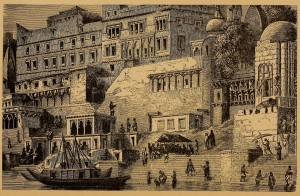Honestly, I do have these doubts at times that Shakespeare knew the city of Varanasi more intimately than we credit him for it. In fact, his oh so famous quip about the relevance of a name, or rather the irrelevance of it, was actually penned to encapsulate the radiant perseverance of the world’s oldest city. You see, a rose by any other name might smell as sweet, the name is hardly a factor there. But on the other hand, it is the city of Varanasi, or Benares, or Kashi that underscores the temperance and the  permanence of things. Through the ages the motley township of a million temples closeted on either sides by two rivers Varuna and Assi, with the mighty Ganga flowing right through the heart of it, has been known by different names at different times, but it never really did matter, because no one name or a single title will ever be encapsulate the true essence of the city, the language that could do so, has not been invented as yet. Little wonder, through the very many ages the city of Kashi has been known by so many other names, Kasika, Avimukta, Anandavana, Rudravasa.
permanence of things. Through the ages the motley township of a million temples closeted on either sides by two rivers Varuna and Assi, with the mighty Ganga flowing right through the heart of it, has been known by different names at different times, but it never really did matter, because no one name or a single title will ever be encapsulate the true essence of the city, the language that could do so, has not been invented as yet. Little wonder, through the very many ages the city of Kashi has been known by so many other names, Kasika, Avimukta, Anandavana, Rudravasa.
Subah-e-Banaras…
Step into the city at 4 am, you will be transported to another portal in a totally different dimension. A million temple clangs, a billion murmured hymns, the little rush of feet to the nearest ghat, the gentle wave of the serene ganga moving to its own cosmic hum, all this weave a magical blanket that rests over the city where time is of no consequence. Benares is regarded as the oldest living city in the world, it was a part of the original Mahajanapadas, the 16 republic states that dotted this land a thousand years before Christ was born, Athens, Troy or Sparta were mere tiny hamlets back then. Babylon was a thriving trade center, the Pyramidal pharaohs of Egypt were still very much in place, the roads to Rome had not yet been conceived, let alone being built and so on. With the legacy of the grand Harappa behind, the civilisation in the land was taking new shape. The city predates even Lord Mahavira. And not surprisingly a distraught prince confounded by the vagaries of life, death and the entangled cycle, found peace, solace, knowledge and nirvana sitting under a banyan tree in this very city. Kashi had the power to turn prince Siddhartha into Gautama Buddha.
The beauty of Kashi is that you don’t require an archaeologist to dig through the stratified mounds to uncover the passage of time. It is said that it is the favoured city of Lord Shiva, the destroyer, the ascetic, the all-pervading all powerful omniscient simpleton, Bholenath. Legend has it, that the city rests on one of the pointed tips of his trishul, thus protected by the very deity that destroys all. Not surprisingly, Kashi exists in a dimensional space, where time ceases to exist. The passage of time, hours, days, months, years, centuries, millenniums, is merely a statistic. Empires fall, empires created, new beliefs sprung up and old lose faith, the city has seen it all, gone through it all, without being affected or impacted. Kashi has always existed and will always, it has transcended the limitations imposed by of dimensions that we know, time, and space. Continue reading
